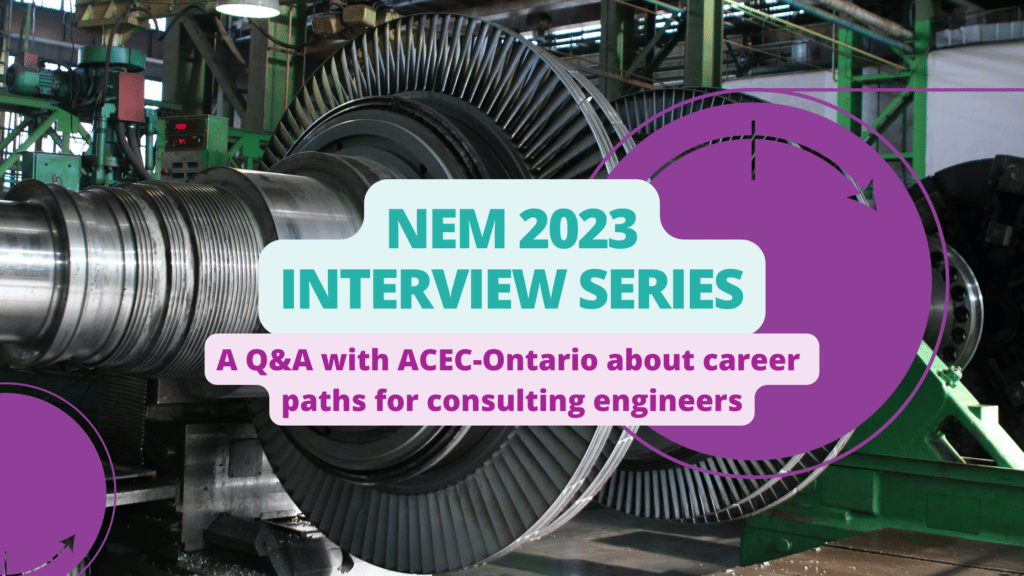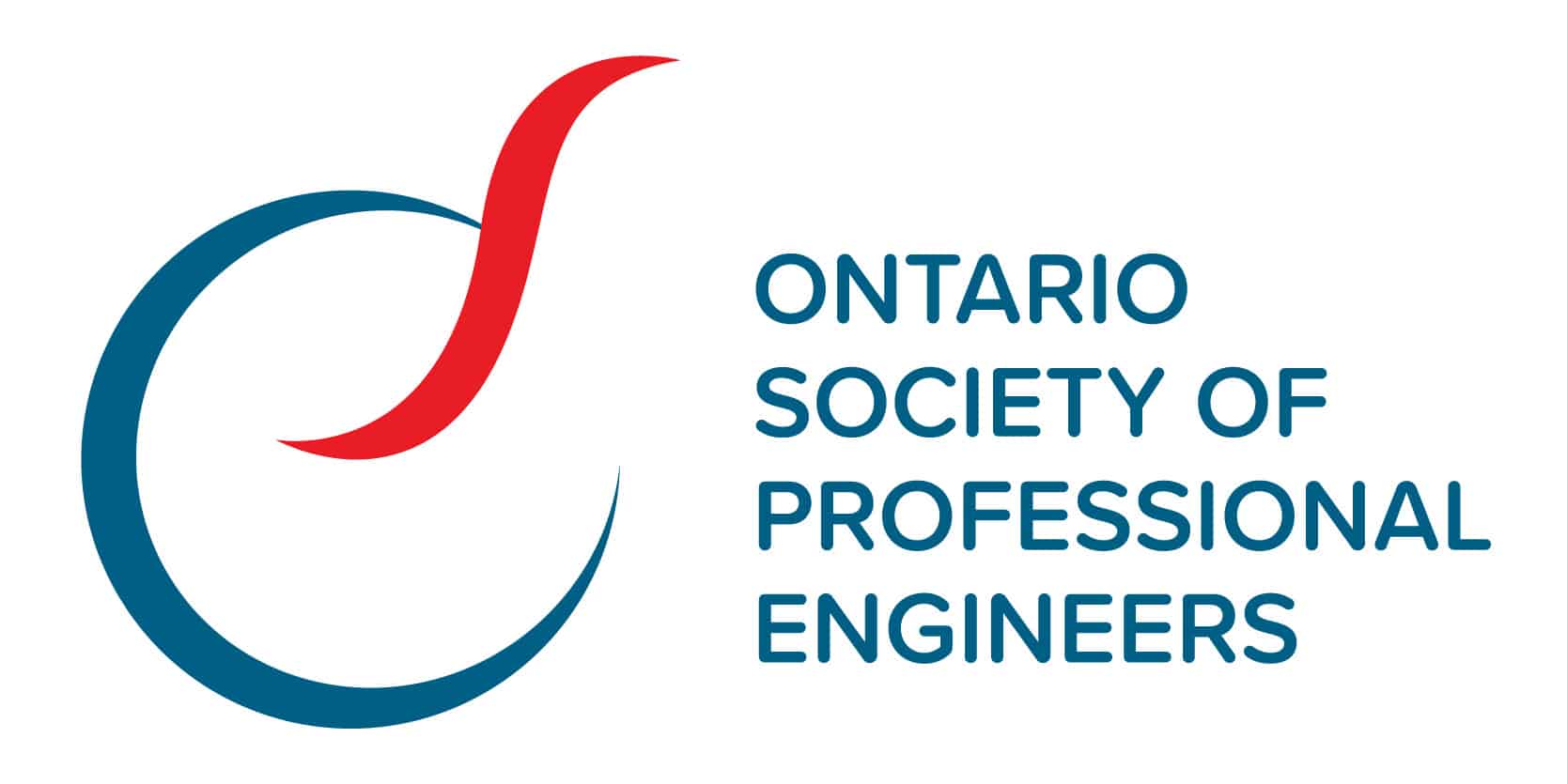
As National Engineering Month Ontario (NEM) events progress, we’re connecting with leading members of Ontario’s engineering community to talk about where the field is headed.
This week I met with Bruce G. Matthews, P.Eng., who is the Executive Director of ACEC-Ontario. On March 2, ACEC-Ontario hosted a NEM Ontario event that provided insight into the world of consulting engineering (recording can be found here) and on March 31, they are hosting another event “Beyond your profession – a government relations lens” that we hope you will sign up for.
With these events in mind, what follows is a Q&A session about the different career paths that are available to consulting engineers.
What are the consulting engineering disciplines that those working towards their P.Eng can become involved in?
Consulting engineering is not a discipline by itself but defines the relationship between an engineering service provider and the recipient of the services. Consulting engineers can be from any engineering discipline, but most engineers employed by ACEC-Ontario member companies are from the civil engineering realm. There are also individuals from the environmental, mechanical, and electrical engineering disciplines. Municipal engineering, which covers infrastructure and works that municipalities rely on, such as transportation, water supply and treatment, wastewater management, and land development issues, is often driven by civil and/or environmental engineering. Aside from that, there are consulting engineering companies that specialize in niche areas, such as acoustical, lighting, or human factors engineering. The range of services offered in consulting engineering varies from broader municipal infrastructure to specialized niche services, all defined by the relationship between the engineering company and the client.
Beyond the scope of disciplines, what types of consulting engineering career paths are available to young engineering professionals?
Consulting engineering firms do hire fresh graduates and co-op students. Many firms have established professional development programs and if a co-op student performs well, they may be employed by the same firm after graduation. For example, I was recently speaking with a person who started as a co-op student, became an engineering graduate, got their professional licence, and has now been with the same firm for 30 years, working their way up to senior director and project manager. Career progression within a consulting engineering firm usually involves taking on larger responsibilities, from design specification to project management and eventually business management. Consulting engineering firms are independent businesses and require business acumen, a business development mindset, and expertise in engineering practice. Over time, engineers may also become involved in strategic and executive management at the firm.
What career paths do you foresee being in further demand in the next 10 years?
Our consulting engineering firms primarily work on municipal infrastructure projects. The demand for infrastructure is expected to increase with population growth over the next 30-50 years. New infrastructure will be needed to serve these areas and existing infrastructure will need to be enhanced. However, the work will not be the same as it was in the past. Designing for climate resilience will be crucial to ensure the infrastructure has a 50-75-100 year service life.
Innovative thinking and new technologies will be in demand to support climate resilience. Business acumen will also be important for engineers to understand the economics and business elements of the projects and to convince clients of the value of taking certain approaches. It will be important to minimize costs and provide the best value for taxpayers.
What are the activities of professional engineers who accept accountability for engineering work?
Great question. So, as I’ve mentioned, a firm will often hire fresh graduates and give them the experience they need to obtain their P.Eng. licence. Once they obtain it, they will have a world of opportunities. Professional engineering work and applying the seal are all about individual responsibility and accountability. When an engineer applies their engineering seal to a report or drawing, they are putting their reputation on the line and must take that accountability seriously. Engineers will always remember when they first apply their seal – the specific project and the nature of the work – it is a significant moment for them. As junior engineers in a consulting firm, they may start by working on the design and specifications for a drainage project, such as pumps or piping. With further experience, they may have responsibility for a water supply or wastewater treatment facility and eventually have overall responsibility for a project, including planning and proposal work. This progression can continue throughout their career as they take on more responsibility and have more engineers reporting to them. At the project management level, they may also specialize in a particular area while coordinating with other engineers to provide seamless results to the client. However, they are responsible for the overall outcome and cannot blame other engineers for mistakes. This progression of responsibility and accountability can make for a very interesting career.
Using your own career, and others you know, what are the career paths for P.Eng’s in Canada?
The bottom line is that the opportunities in the field of engineering are limitless. An engineering education from an accredited university provides a great foundation for a variety of careers, not just professional engineering. For those who wish to obtain their Professional Engineering (PE) licence, the licence grants the holder the right to engage in the broad range of activities centered around the application of engineering principles, with the goal of safeguarding life, health, property, economic interests, the public welfare, and the environment. There are two paths in the field: becoming an expert in a specific subject matter or a more general path, working your way up the organization, and dealing with the big picture. These paths are generally distinct and mutually exclusive. For example, one path may lead to becoming a guru-level expert in a specific area, while the other may lead to taking on more responsibilities and eventually running the company. Both paths are possible and can lead to success, with PEs ranging from working-level engineers to executive management.
What advice would you share with the next generation of P. Eng. leaders?
I have a few thoughts on P. Eng.’s licence. Firstly, it should be acknowledged that a P. Eng.’s licence is, in essence, a licence to learn as much as it is to practice engineering. Getting your P. Eng. does not make you an expert in anything, it just shows that you have the necessary knowledge, skills, and judgment to take on the responsibility according to the regulatory framework. However, it’s crucial not to practice in areas where you don’t have adequate training and experience. This is an important limitation of the licence.
It’s also important to view the licence as a starting point in a career and not an end goal. Good engineering practice is about the appropriate application of knowledge, skills, and judgment. An engineering degree provides foundational knowledge, and skills can be developed through training and experience, but good engineering judgment only comes through experience, by doing, observing others, and understanding what works and why.
Engineers must continuously improve their skills and knowledge, and to do this, it’s essential to reflect on past work and ask how it could have been better. It’s also beneficial to find a mentor, someone who inspires you and can provide guidance and knowledge. This can be someone in your organization or within a technical association that corresponds to your engineering practice area.
In conclusion, finding a mentor is crucial for future leaders, and learning from current leaders is equally important. Try to get their time and attention to learn as much as you can.
Why would you recommend working in consulting engineering?
I really want to frame this as being all about the amazing outcomes you can achieve and the impact you can make. As I mentioned earlier, professional engineering is all about safeguarding the public welfare, and consulting engineering is at the forefront of that work. All engineers have some impact, but an engineer working for an automotive manufacturer, or an industrial engineer in an assembly plant, is important but not the same as the breadth of influence that a consulting engineer will have when building a facility that will house thousands of people or an entertainment theater where thousands of people sit to enjoy the experience. It’s the ability to have a direct impact on the social, environmental, and economic welfare of both the client and the end user that makes consulting engineering important, interesting, and fascinating.
The road you drive on and the bridge you cross are examples of the visible things engineers do, but there is also a lot of work that is hidden behind walls and underground that people take for granted and rely on every day. Despite the importance of this work, engineers don’t often receive recognition because it is taken for granted. However, there should be a huge amount of pride in what engineers do, from turning on a light switch to getting reliable water, and that pride is something you can look back on and say “I had a role in this.”
A career in consulting engineering guarantees that every day will be different, with different projects, clients, and technologies to use. In 25-30 years, the field will be vastly different from what it is now, and being able to participate in and take advantage of these changes is what makes this a career you can be proud of. You’re not just putting in time in a routine 9-to-5 job, you are making a notable impact and actually seeing it happen. This sense of satisfaction is what I believe makes engineering such an attractive career to those who want to make a difference.
Any final thoughts?
Our continued support for National Engineering Month Ontario has involved us as a Champion Level for a few years now. We appreciate the relationship we have with the organization and do what we can to make National Engineering Month a success. Our perspective, based on consulting engineering, is not often at the forefront of people’s minds. We appreciate the opportunity to help spread the message about engineering careers within consulting firms and how important they are. Our firms are busy with a lot of work on their books and are always looking for people. It’s a good time to be in the industry.
If you’re interested in learning more about consulting engineering please visit the ACEC-Ontario website.
Learn. Grow. Thrive. Together.
With bold topics, industry expertise, and diverse perspectives – National Engineering Month is Ontario’s engineering event of the year. Together we can advance the engineering profession, spark an interest in the next generation of engineering professionals and celebrate the role that engineers play in our society. We hope you can be a part of the action by attending a #NEM2023 event. For more information about National Engineering Month Ontario events, please visit nemontario.ca.


